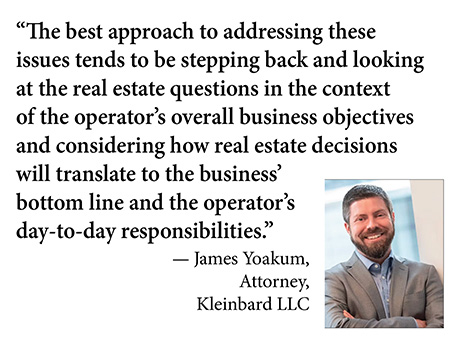By James Yoakum, attorney, Kleinbard LLC
Many clients of commercial real estate attorneys are full-time, professional real estate investors who live and breathe cap rates, vacancy allowances, loan-to-value ratios and the latest hot adaptive reuse opportunities. However, another large portion of those clients are not real estate obsessives, but rather business owners across a variety of industries who see their real estate needs as just another expense item on the profit-and-loss statement — akin to payroll, utility bills and taxes.
This writer also had a similar mix of real estate investor clients and “operating business” clients in his prior career on the brokerage side of the real estate world and has subsequently gained an appreciation for how both types of clients approach transactions.

This article offers some key points for brokers, attorneys and other service providers to keep in mind when advising business owners and operators on their real estate needs, wherein operational priorities — rather than traditional real estate investment metrics — are typically key to structuring deals that work long-term.
The Big Question: Own vs. Lease?
Whether a business should own or lease the real estate that it operates out of is one of the biggest considerations for business owners. It’s also a business decision that people have very strong opinions on. For most attorneys, surprisingly, that answer is almost always “it depends” — not the typical “business school answer” that most operating businesses have “no business” owning real estate.
When weighing the buy-versus-lease decision, thinking through a few criteria about the business in question can be helpful:
- If the business needs to be in one specific place long term or requires a highly specialized custom building, that can tilt the scales toward owning. For example, consider a Las Vegas casino: the location and style of the building are integral to the brand, so it makes sense for the casino operator to own and control the real estate long-term.
- If a business needs cookie-cutter office or warehouse space and is growing (or shrinking) rather quickly, leasing space can provide maximum flexibility to make smart business decisions without the overhead and responsibility that comes with ownership. At the extreme end of this spectrum, many fast-growing startups choose to lease coworking type spaces that can be expanded or reduced relatively seamlessly as the business evolves.
- If a business has excess cash and no obvious avenues to reinvest that cash into the business, then owning the real estate occupied by the business is one option to put some of that excess cash to work in a stable asset. This is the inverse of the textbook answer that most businesses should not own real estate because it ties up cash that they would be better off reinvesting into growing their core business. In the real world, some core businesses aren’t great investments or simply can’t consume the amount of cash sitting on the balance sheet. This is why we’re starting to see cash-heavy tech companies, such as Apple and Amazon, break out their checkbooks to buy California and Manhattan office buildings where they already leased from third-party landlords; they literally have more cash than they know what to do with.
Key Lease Term Considerations
If leasing is the more strategic route for an owner or operator, it’s important not to take a “one-sized-fits-all” approach. The list of terms that go into a commercial lease could fill a book (and sometimes our leases end up looking like novels). But there are a few key terms that often take on outsized importance to business operators who have chosen to lease space:
- Build-out responsibilities and timelines for new spaces can be some of the most complex portions of commercial leases, and these provisions are often hidden in a work letter exhibit at the very end of the document. The attorney’s job is to translate these terms into plain English and draw out a timeline of “who does what and when,” as well as to encourage clients to have an architect and/or contractor review the build-out language in detail. Taking this additional step ensures that the lease describes what the tenant will actually need for its operations.
- Renewal (aka extension) options are typically a big focus for seasoned operator tenants — meaning those who understand the headache of renewing a lease without any leverage. But to “greener” operators and start-up businesses, renewal options beyond a lease’s initial five- or 10-year term may seem remote compared to the immediate needs of getting started and staying open in the short-term. However, at the end of the day (term?), renewal options are incredibly valuable and having more tenant-friendly terms will allow more flexibility as the business evolves.
- Exclusivity of use is another way to pack value into a lease, especially for retail businesses that want to limit competition. Many small retailers will balk at the rental rates charged by the nice, big, new shopping center owners. But when you factor in that the landlord at such a center may give you exclusivity to be the only business of your kind in the primary retail destination for the area, then the value is more compelling. On the flip side, signing a lease at such a center without getting exclusivity is leaving real value on the table.
- Landlord default remedies are an important area to consider fine-tuning, even if most well-counseled landlords won’t budge much from the standard language. Any ability to perform self-help or withhold rent from a derelict landlord gives tenants a shot at resolving issues quickly and keeping their focus on running their business rather than wasting time and energy trying to keep a negligent landlord in line.
Navigating Excess Space
Many operators, especially office users in the post-pandemic era, struggle with what to do when they have too much space (either leased or owned).
For excess space in a building owned by the user, this is easier to solve: The owner-occupant can lease the extra space to any other user that will take it without anyone else’s consent or conditions. For leased space, however, the landlord will typically have some consent rights over subleases and may even have the right to take back space that the tenant isn’t fully utilizing.
It’s ideal to have conversations with business owner-operators early on in their “space shopping” process around their business’ growth trajectory, space use patterns and compatibility as a “space sharer” with other businesses. These conversations can inform lease negotiations around subletting and assignment provisions that can become highly important as a business’ needs for real estate evolve over time.
Real Estate as Leverage
Business operators can leverage their real estate through… leverage, aka financing.
- For a business that already owns its real estate, that real estate is a hard asset that is typically easy to borrow against on favorable terms, providing a potential source of growth capital for the business. Alternatively, for operators acquiring businesses, certain loan programs, such as the Small Business Administration 7(a) program, provide much longer amortization terms for acquisitions that include both an operating business and its real estate.
- Financing is also relevant for businesses that lease their spaces in that it is often helpful to think of the lease as a form of financing, especially when negotiating terms for tenant improvement allowances and landlord build-out work. Comparing the cost of baking build-out costs into the rent over the term of the lease — versus borrowing to perform the build-out “in-house” — can be a useful exercise and can often show a landlord’s “financing” terms to be quite friendly.
The above points merely scratch the surface of the real estate-related concerns that business operators encounter. But the best approach to addressing these issues tends to be stepping back and looking at the real estate questions in the context of the operators’ overall business objectives and considering how real estate decisions will translate to the business’ bottom line and the operator’s day-to-day responsibilities.
James Yoakum is an attorney with Kleinbard LLC in Philadelphia. He has extensive experience in commercial real estate law and real estate finance and represents clients in commercial mortgage financings, development projects, acquisitions, dispositions and leasing transactions.


